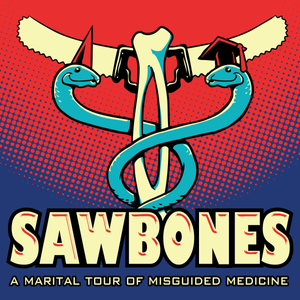
Cotard: the 'Walking Corpse Delusion'
12/03/18 • 13 min
Clinical psychologist Professor Daniel Freeman continues his exploration of delusions, looking at both historic and contemporary case studies.
In this programme, he examines Cotard's Syndrome - the belief that you are dead.
In Paris in 1880, Jules Cotard wrote the case study of a 43-year-old woman he called Mademoiselle X. He described her condition as “le délire des negations”. He recorded how she claimed to have “no brain, no nerves, no chest, no stomach and no intestines”. The “delusions negation” wrote Cotard, “extended to the metaphysical”, as Mademoiselle X believed “she has no soul and accordingly she does not need to eat in order to live.” She is recorded as dying of starvation.
Cotard’s Syndrome is often an extension of severe depression, a person’s explanation of experiences of disassociation and detachment. To find out more Daniel meets Sophie, who shares her own experience of believing she was dead.
Daniel's research at the University of Oxford focuses on improving our understanding and treatment of delusions – strongly held and preoccupying false beliefs. In this series he unearths case studies from the Renaissance, through to the asylums of 19th-century Paris and Victorian Britain. He meets people who have experienced delusional thinking first-hand and discovers more about the latest thinking on delusions from psychologists and psychiatrists. The purpose is to better understand this common but too-often unexplored human experience.
Produced by Victoria Shepherd and Eve Streeter A Greenpoint production for BBC Radio 4
Clinical psychologist Professor Daniel Freeman continues his exploration of delusions, looking at both historic and contemporary case studies.
In this programme, he examines Cotard's Syndrome - the belief that you are dead.
In Paris in 1880, Jules Cotard wrote the case study of a 43-year-old woman he called Mademoiselle X. He described her condition as “le délire des negations”. He recorded how she claimed to have “no brain, no nerves, no chest, no stomach and no intestines”. The “delusions negation” wrote Cotard, “extended to the metaphysical”, as Mademoiselle X believed “she has no soul and accordingly she does not need to eat in order to live.” She is recorded as dying of starvation.
Cotard’s Syndrome is often an extension of severe depression, a person’s explanation of experiences of disassociation and detachment. To find out more Daniel meets Sophie, who shares her own experience of believing she was dead.
Daniel's research at the University of Oxford focuses on improving our understanding and treatment of delusions – strongly held and preoccupying false beliefs. In this series he unearths case studies from the Renaissance, through to the asylums of 19th-century Paris and Victorian Britain. He meets people who have experienced delusional thinking first-hand and discovers more about the latest thinking on delusions from psychologists and psychiatrists. The purpose is to better understand this common but too-often unexplored human experience.
Produced by Victoria Shepherd and Eve Streeter A Greenpoint production for BBC Radio 4
Previous Episode

Napoleon and 'Delusions of Grandeur'
Clinical psychologist Professor Daniel Freeman begins an exploration of delusions, looking at both historic and contemporary case studies. He hears first about the fourteen "Emperor Napoleons" who presented at Bicetre Asylum in Paris in 1840, the year Napoleon's body was returned to the city.
This "Delusion of Grandeur", featuring Napoleon in particular, continued as an intriguing phenomenon for many decades afterwards.
"That first day we found him dressed elegantly, head held high, with a proud, haughty air; his tone was that of command, and his least gestures indicated power and authority. He soon informed us that he was the Emperor of France, with millions in riches, that Louis Philippe was his chancellor, etc. Then... he pompously recited verses of his own commission, in which he allocated kingdoms, settled the affairs of Belgium and Poland, etc. During the day he smashed everything because people would not obey his every order." Charenton Asylum, Paris. Register of Medical Observations. Patient admitted June 10th 1831.
Daniel Freeman also meets a woman who experienced a "Delusion of Grandeur" in more recent years, and hears her first-hand account of believing for a time that she was Christ.
Producers: Victoria Shepherd and Eve Streeter A Greenpoint production for BBC Radio 4
Next Episode

Francis Spira and the 'Delusion of Despair'
Clinical psychologist Professor Daniel Freeman continues his exploration of delusions, looking at both historic and contemporary case studies.
In this programme he examines the Delusion of Despair.
He begins with the story of Francis Spira, the 15th-century Italian lawyer who believed he was damned by God – a case of delusional thinking that haunted the 16th and 17th centuries, and inspired Christopher Marlowe’s Doctor Faustus.
In the last 20 years, our appreciation and understanding of delusions - a strongly held, fixed, false belief - has begun to shift enormously. Delusional ideas are remarkably common in the population. And delusions are closely tied to a person’s sense of self, their views of the world and what is happening in the environment.
Daniel talks to Cheryl to find out how an excessively negative sense of self can set in motion a troubling line of thought that other people may be judging you, observing you, and waiting to punish you.
Produced by Victoria Shepherd and Eve Streeter A Greenpoint production for BBC Radio 4
If you like this episode you’ll love
Episode Comments
Generate a badge
Get a badge for your website that links back to this episode
<a href="https://goodpods.com/podcasts/a-history-of-delusions-6666/cotard-the-walking-corpse-delusion-245349"> <img src="https://storage.googleapis.com/goodpods-images-bucket/badges/generic-badge-1.svg" alt="listen to cotard: the 'walking corpse delusion' on goodpods" style="width: 225px" /> </a>
Copy




